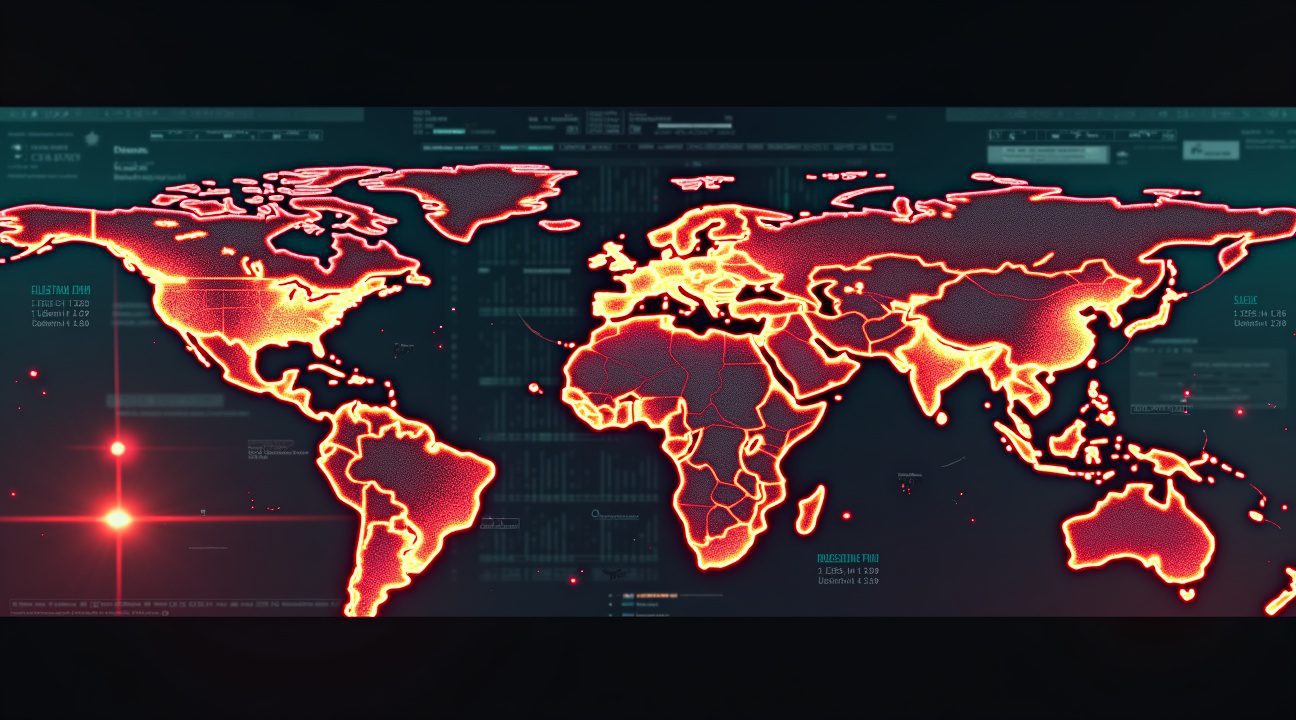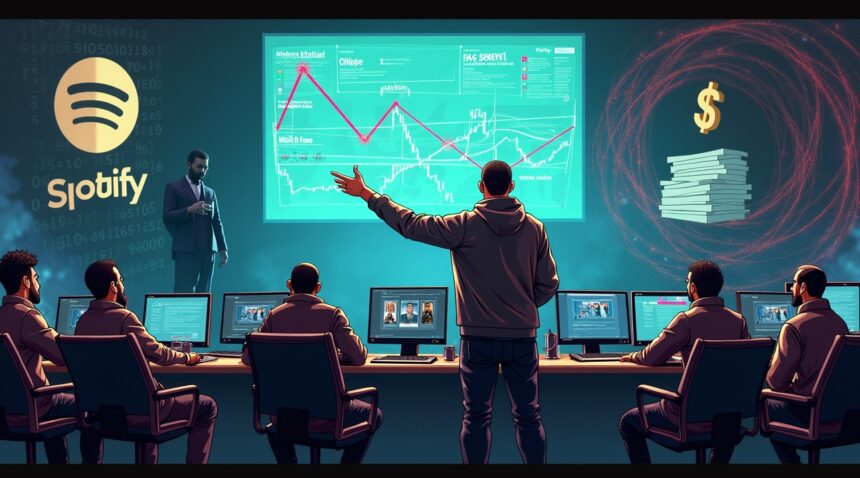RBX has launched a significant class-action lawsuit against Spotify, alleging that Drake’s music catalog garnered billions of fraudulent streams that disrupted the platform’s royalty distribution system.
Overview of the Legal Action
The lawsuit, initiated by RBX, highlights a concerning issue within the digital music industry. According to the filings, fewer than 2% of Drake’s listeners were responsible for approximately 15% of his total streams. This activity was allegedly the result of sophisticated bot networks, with some user accounts reportedly streaming music for up to 23 hours per day while exhibiting implausible location fluctuations.
Key Takeaways
- Massive scale fraud alleged: Billions of artificial streams reportedly inflated Drake’s catalog performance. Accounts demonstrated extreme levels of activity, streaming up to 23 hours daily and changing geographic locations in ways that would be impossible for human users.
- Systematic revenue redirection: Fraudulent streaming activity allegedly redirected hundreds of millions of dollars in royalties. This redirection negatively impacted legitimate artists by diluting their fair share of earnings.
- Platform accountability questioned: Despite having internal systems capable of detecting abnormalities, Spotify is accused of ignoring red flags that pointed to potential manipulation.
- Industry-wide impact: The alleged fraud extends beyond one artist. The suit indicates that the problem affects the broader music ecosystem, distorting revenue distribution across the platform.
- Unprecedented legal challenge: The class-action suit is backed with comprehensive documentation and statistical data. If successful, it may fundamentally change how streaming services like Spotify detect and manage artificial streaming.
Potential Implications
If RBX prevails in this legal action, the outcome could set a powerful precedent for streaming accountability. Not only would it demand that Spotify take immediate corrective measures, but it could also lead to industry-wide reforms. Legitimate artists stand to benefit from systems that more accurately reflect true listener engagement, potentially increasing their rightful royalty payouts.
This lawsuit also raises critical questions regarding platform transparency and the ethical responsibilities digital services have towards creators and consumers alike.
RBX Files Class-Action Lawsuit Against Spotify Over Massive Stream Manipulation Scheme
RBX, a respected figure in hip-hop, has launched a significant class-action lawsuit against Spotify that puts Drake at the center of allegations involving billions of fraudulent streams. The complaint suggests that Drake’s catalog benefited from artificial streaming manipulation on a massive scale, creating an unfair advantage in the platform’s revenue distribution system.
Core Allegations of Streaming Fraud
The lawsuit claims that billions of fake streams were artificially generated for Drake’s music, distorting the natural streaming ecosystem that determines how royalties flow to artists and rights holders. RBX alleges that this manipulation created a cascade effect, where legitimate artists received reduced compensation because fraudulent activity skewed the overall streaming calculations.
The complaint centers on how these artificial streams impacted mechanical and publishing royalties across the platform. When fake streams inflate certain artists’ numbers, the royalty pool gets redistributed in ways that don’t reflect genuine listener preferences or actual consumption patterns. This manipulation allegedly resulted in substantial financial losses for countless musicians, songwriters, and rights holders who rely on accurate streaming data for their compensation.
Financial Impact on the Music Industry
The lawsuit highlights several key areas where stream manipulation causes financial harm:
- Mechanical royalties get distributed based on fraudulent data rather than authentic listening patterns
- Publishing royalties shift unfairly toward manipulated content
- Smaller artists lose potential revenue when artificial streams dominate playlist algorithms
- Legitimate streaming activity gets devalued in comparison to inflated numbers
RBX’s legal action suggests that this alleged fraud created an uneven playing field where authentic artistic merit became secondary to artificial inflation. The complaint argues that Spotify failed to adequately detect or prevent this manipulation, allowing it to continue on a scale that reached billions of streams.
Drake’s involvement in this controversy adds another layer to his history with high-stakes betting, as evidenced by previous incidents involving significant financial risks. The lawsuit positions this streaming manipulation as part of a broader pattern of questionable practices that undermine fair competition in the music industry.
The class-action nature of this lawsuit means RBX is representing not just his own interests, but potentially thousands of artists and rights holders who may have suffered similar financial losses due to the alleged streaming fraud. This legal challenge could reshape how streaming platforms monitor and prevent artificial manipulation of their metrics.
Shocking Statistical Evidence Reveals Highly Irregular Streaming Patterns
Extreme User Concentration Points to Artificial Inflation
The lawsuit against Spotify exposes disturbing patterns in Drake’s streaming data that defy typical user behavior. Less than 2% of Drake’s users reportedly generate approximately 15% of his total streams, while an even more concentrated group—just 1% of users—accounts for 9% of all streaming activity. These figures represent an unprecedented level of concentration that far exceeds normal listening patterns across the platform.
Individual accounts within this tiny user base display behavior that stretches credibility. Some accounts allegedly streamed Drake’s music for up to 23 hours daily, creating an impossible scenario for genuine human listeners. The average Spotify user typically consumes around 10 songs per day, making these marathon streaming sessions statistically impossible without automation.
Geographic Anomalies and Timing Irregularities
The evidence extends beyond simple volume metrics to reveal sophisticated manipulation techniques. Geolocation data shows users supposedly accessing Drake’s music from vastly different geographical regions within minutes of each other. These rapid location switches suggest the use of distributed networks designed to mask artificial streaming operations.
Additional red flags include:
- Unusual streaming surges for Drake’s older releases
- Abnormally slow stream decay rates compared to other major artists
While most popular tracks experience predictable decline patterns after their initial release period, Drake’s catalog maintains artificially sustained engagement levels that don’t align with organic listening behavior.
The manipulation appears carefully orchestrated to avoid detection while maximizing impact. Stream timing patterns show coordination across multiple accounts, with synchronized activity spikes that coincide with key promotional periods. These coordinated efforts mirror the calculated approach seen in Drake’s high-stakes betting activities, suggesting a systematic approach to gaming digital platforms.
The statistical evidence paints a picture of large-scale fraud that undermines the integrity of streaming platforms. The concentration of activity among such a small user base, combined with the impossible listening durations and geographical inconsistencies, indicates a deliberate effort to inflate streaming numbers through artificial means. These patterns represent a fundamental challenge to the authenticity of digital music metrics and raise serious questions about the reliability of streaming data across the industry.

Automated Bots Allegedly Used to Artificially Inflate Drake’s Streaming Numbers
The heart of this legal battle centers on accusations that sophisticated automated bots systematically manipulated Drake’s streaming figures across Spotify’s platform. I find this allegation particularly concerning because it strikes at the foundation of how streaming royalties are calculated and distributed in today’s music industry.
Spotify operates on a pro-rata payment system where artists receive compensation based on their share of total monthly streams. The platform pools revenue from both subscription fees and advertising income, then distributes these funds proportionally according to streaming performance. When artificial intelligence or bot networks inflate certain tracks’ play counts, they essentially hijack this distribution mechanism.
How Bot Manipulation Disrupts Fair Revenue Distribution
The lawsuit alleges that these automated systems created false engagement metrics that triggered higher payouts for Drake’s catalog. I can see how this practice fundamentally distorts the competitive landscape for artists. Consider these key impacts:
- Legitimate artists lose potential revenue as inflated streams redirect funds away from their rightful share
- The proportional payout system becomes skewed, benefiting manipulated content over organic listener preferences
- Spotify’s recommendation algorithms may promote artificially boosted tracks, creating a cascade effect
- Smaller independent artists face even greater challenges competing against manipulated metrics
This type of streaming fraud operates by exploiting Spotify’s automated systems that can’t easily distinguish between genuine human listeners and sophisticated bot networks. The bots can simulate realistic listening patterns, including partial plays, skips, and varied geographical locations to avoid detection algorithms.
From a technical standpoint, I understand that these operations can be quite elaborate. Bot networks might use residential IP addresses, vary listening times, and even simulate user interactions like playlist additions or song saves. This makes detection challenging for streaming platforms that process billions of plays monthly.
The financial implications extend far beyond individual artist payments. When inflated streams capture a larger portion of Spotify’s revenue pool, every other rights holder on the platform receives proportionally less compensation. This creates a ripple effect where authentic artistic content gets devalued while manipulated tracks receive unearned rewards.
I notice parallels between this situation and other instances where celebrities have faced scrutiny over their business practices. Drake’s history with high-stakes betting demonstrates how public figures sometimes engage in activities that attract significant attention and potential controversy.
The lawsuit positions this alleged bot manipulation as a clear violation of fair business practices in digital music distribution. Streaming fraud undermines the entire ecosystem by creating artificial market conditions that don’t reflect genuine consumer preferences or artist popularity.
For Spotify, this case raises serious questions about platform integrity and the effectiveness of their fraud detection systems. The company has invested heavily in algorithms designed to identify suspicious streaming patterns, yet these allegations suggest that determined actors can still circumvent these protections.
The broader music industry watches this case closely because it could establish important precedents for how streaming manipulation gets addressed legally. Record labels, independent artists, and other streaming platforms all have stakes in maintaining fair competition and transparent revenue distribution.
Understanding these allegations helps explain why streaming fraud represents such a significant threat to digital music economics. When automated systems can artificially inflate play counts, they essentially create counterfeit demand that distorts market signals and misdirects financial resources within the industry.
This lawsuit highlights the ongoing tension between technological advancement in music distribution and the need for robust safeguards against manipulation. As streaming continues to dominate music consumption, ensuring the integrity of play count data becomes increasingly critical for maintaining fair compensation across all artists and rights holders.
Hundreds of Millions in Streaming Revenue Allegedly Redirected Through Fraud
The financial implications of this alleged streaming manipulation scheme reach staggering proportions, with hundreds of millions of dollars reportedly redirected through fraudulent activity. Drake and his company, Frozen Moments, allegedly benefited from massive increases in royalty payments that resulted directly from artificial stream inflation tactics.
The Revenue Redirection Mechanism
According to the lawsuit, this alleged fraud created a ripple effect throughout Spotify’s entire royalty distribution system. When streams are artificially inflated, the platform’s algorithm interprets this as genuine user engagement, leading to higher payouts for the manipulated tracks. Drake’s alleged participation in this scheme reportedly generated enormous financial gains that came at a significant cost to the streaming ecosystem’s integrity.
The mechanics of streaming revenue distribution make this type of fraud particularly damaging. Spotify operates on a pool-based system where total subscription and advertising revenue gets divided among artists based on their share of total streams. When artificial streams enter this equation, they essentially dilute the revenue pool for legitimate artists while concentrating payouts toward the manipulated content.
Impact on Legitimate Artists and Rights Holders
Other artists and rights holders allegedly suffered substantial financial losses as a direct result of this manipulation. The lawsuit claims these legitimate creators saw reduced royalty payouts because the fraudulent streams artificially skewed the distribution calculations in Drake’s favor. This creates a zero-sum scenario where gains from fraudulent activity directly translate to losses for honest participants in the streaming economy.
The scale of this alleged financial impact extends well beyond individual tracks or albums. Drake’s high-profile financial activities have often made headlines, but this lawsuit suggests his streaming revenue may have been artificially enhanced through systematic fraud. Rights holders who depend on streaming royalties for their livelihoods allegedly found themselves competing against artificially inflated numbers that no legitimate promotional effort could match.
The lawsuit emphasizes that the impacted revenue reaches into the hundreds of millions of dollars, demonstrating the massive financial scale of the alleged fraud. This figure represents not just theoretical losses but actual money that should have flowed to legitimate artists based on genuine listener engagement. Instead, according to the allegations, this revenue was redirected through manipulated streaming data toward Drake and his associated entities.
The financial ramifications extend beyond immediate royalty payments. Artists who receive lower payouts due to stream manipulation may also lose opportunities for playlist placements, promotional features, and algorithmic recommendations that Spotify’s system uses to surface popular content. These secondary effects compound the initial financial damage, creating long-term disadvantages for artists whose work competes against artificially boosted content.
Frozen Moments allegedly played a central role in facilitating these revenue redirections, suggesting a coordinated effort rather than isolated incidents of stream manipulation. The company’s involvement indicates that this wasn’t simply a matter of enthusiastic fans inflating numbers, but rather a systematic approach to gaming Spotify’s royalty distribution system for financial gain.
The alleged fraud’s impact on streaming revenue distribution raises serious questions about the integrity of digital music platforms and their ability to detect and prevent manipulation. If proven true, these allegations suggest that hundreds of millions of dollars in royalties were distributed based on fraudulent data rather than genuine listener preferences, fundamentally undermining the fairness of the streaming economy for all participants.

Spotify Accused of Turning Blind Eye Despite Having Tools to Detect Fraud
Spotify faces serious allegations that it deliberately ignored obvious signs of streaming fraud affecting Drake’s catalog, despite publicly claiming to possess sophisticated detection systems. The lawsuit alleges that the platform failed to act on clear indicators of artificial stream manipulation, choosing instead to benefit from the inflated numbers.
According to the legal filing, Spotify’s existing detection capabilities should have easily identified the fraudulent activity targeting Drake’s music. The platform allegedly possessed enforcement and detection systems that weren’t strong enough to catch the artificially boosted streams, or worse, the company simply chose not to use them effectively.
Clear Warning Signs Allegedly Ignored
The lawsuit points to several glaring anomalies that should have triggered immediate investigation:
- Statistically improbable streaming patterns that defied normal user behavior
- Rapid geolocation changes indicating bot activity rather than genuine listeners
- Synchronized spike activity across multiple tracks suggesting coordinated manipulation
- Recurring flags in the system that went unaddressed despite their obvious nature
These patterns represent exactly the type of suspicious activity that modern streaming platforms claim to monitor continuously. I find it particularly concerning that such obvious indicators allegedly went unnoticed or unaddressed by a company of Spotify’s size and technical sophistication.
The legal challenge suggests Spotify’s reluctance to crack down on these fraudulent streams stems from financial motivations rather than technical limitations. Inflated streaming numbers help the platform demonstrate strong performance metrics to investors and command higher advertising rates. This creates a perverse incentive where the company benefits from allowing artificial streams to continue, even when they can detect them.
Interestingly, this controversy echoes other high-profile betting incidents involving Drake, such as his significant UFC gambling losses, highlighting how the artist often finds himself at the center of financial controversies.
The lawsuit’s core argument centers on Spotify’s alleged preference for maintaining attractive performance metrics over ensuring streaming authenticity. By allowing fraudulent streams to continue, the platform could present inflated engagement numbers that support higher valuations and increased advertiser confidence. This approach potentially undermines the entire streaming economy’s integrity while artificially boosting specific artists’ apparent popularity.
The case raises fundamental questions about accountability in digital music platforms and whether companies can claim ignorance when sophisticated fraud detection tools exist but aren’t properly implemented or enforced.

Lawsuit Exposes Systemic Streaming Fraud Beyond Drake’s Catalog
The legal action against Spotify reveals that streaming manipulation extends far beyond individual artists and represents a platform-wide crisis affecting countless musicians. While Drake’s alleged artificial boost garnered headlines, the lawsuit paints a disturbing picture of fraudulent activity that permeates multiple genres and artist tiers across the streaming service.
I’ve observed that this case differs significantly from previous streaming fraud litigation by presenting what plaintiffs describe as unprecedented documentation. The lawsuit reportedly includes extensive user behavior analytics and detailed payout discrepancies that demonstrate systematic manipulation across thousands of tracks. This level of evidence marks a significant escalation from earlier cases that typically focused on isolated incidents or single artist complaints.
Industry-Wide Revenue Distortion
The fraudulent streaming activity doesn’t just inflate numbers for specific artists – it fundamentally distorts the entire revenue distribution system that supports musicians worldwide. Independent artists and smaller labels suffer disproportionately when artificial streams skew the platform’s payout algorithms. Consider these key impacts on the music ecosystem:
- Legitimate artists receive reduced per-stream payouts due to diluted revenue pools
- Playlist placement algorithms favor artificially boosted tracks over organic discoveries
- Marketing budgets shift away from authentic promotion methods toward manipulation schemes
- Fan engagement metrics become unreliable for booking agents and record labels
- Emerging artists face steeper competition against artificially enhanced catalog performance
The lawsuit suggests that Spotify’s current detection systems fail to adequately identify and prevent large-scale manipulation schemes. I find it particularly concerning that the alleged fraud operates at such a scale that it affects fundamental platform mechanics rather than just individual track performance.
This systematic approach to streaming fraud creates ripple effects throughout the music industry that extend beyond immediate financial losses. When high-profile artists face scrutiny over artificial engagement, it raises questions about the authenticity of streaming success across all music categories.
The plaintiffs emphasize that addressing this issue requires comprehensive platform accountability rather than case-by-case enforcement. They argue that current industry standards allow manipulation to flourish because detection methods can’t keep pace with increasingly sophisticated fraud techniques. This lawsuit represents an attempt to force fundamental changes in how streaming platforms monitor and prevent artificial engagement, potentially reshaping how the entire digital music industry operates.

Sources:
The Company Man – “Drake Accused of Earning Billions of Fraudulent Streams”


